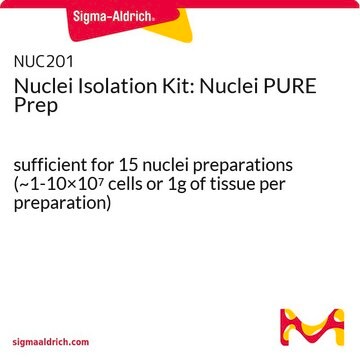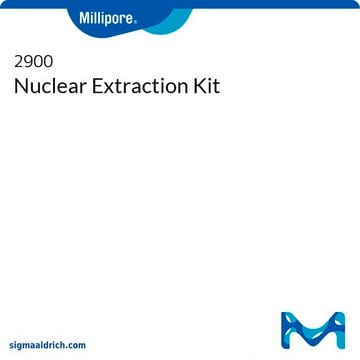NUC101
Nuclei Isolation Kit: Nuclei EZ Prep
sufficient for 25 nuclei preparations (~1-10×107 cells/preparation)
Sinónimos:
Rapid mammalian nuclei isolation kit
About This Item
Productos recomendados
usage
sufficient for 25 nuclei preparations (~1-10×107 cells/preparation)
shelf life
1 yr at 2‑8 °C
packaging
pkg of 1 kit
application(s)
cell analysis
foreign activity
nuclease and protease, free
shipped in
wet ice
storage temp.
2-8°C
General description
Application
Biochem/physiol Actions
Other Notes
related product
Storage Class
10 - Combustible liquids
flash_point_f
Not applicable
flash_point_c
Not applicable
Certificados de análisis (COA)
Busque Certificados de análisis (COA) introduciendo el número de lote del producto. Los números de lote se encuentran en la etiqueta del producto después de las palabras «Lot» o «Batch»
¿Ya tiene este producto?
Encuentre la documentación para los productos que ha comprado recientemente en la Biblioteca de documentos.
Los clientes también vieron
Artículos
Centrifugation separates organelles based on size, shape, and density, facilitating subcellular fractionation across various samples.
Centrifugation separates organelles based on size, shape, and density, facilitating subcellular fractionation across various samples.
Centrifugation separates organelles based on size, shape, and density, facilitating subcellular fractionation across various samples.
Centrifugation separates organelles based on size, shape, and density, facilitating subcellular fractionation across various samples.
Nuestro equipo de científicos tiene experiencia en todas las áreas de investigación: Ciencias de la vida, Ciencia de los materiales, Síntesis química, Cromatografía, Analítica y muchas otras.
Póngase en contacto con el Servicio técnico













